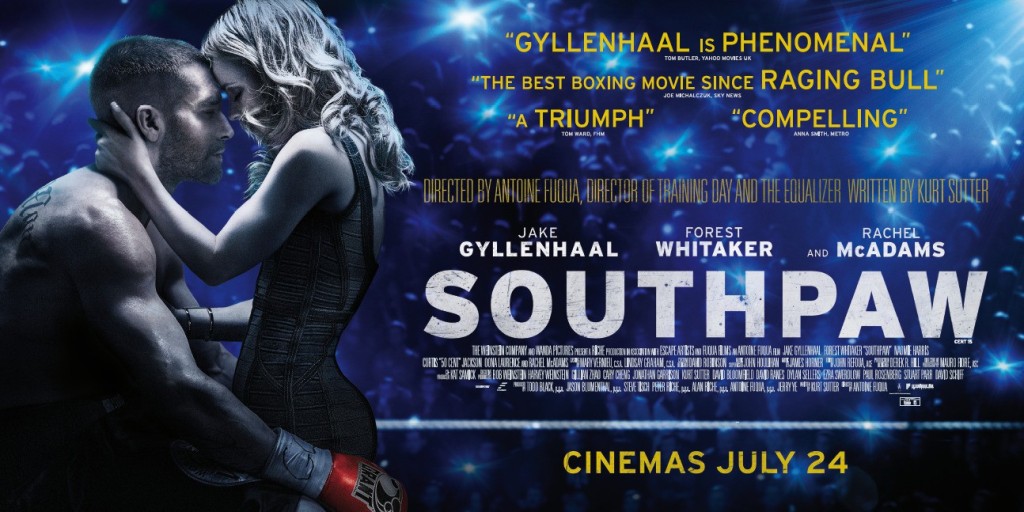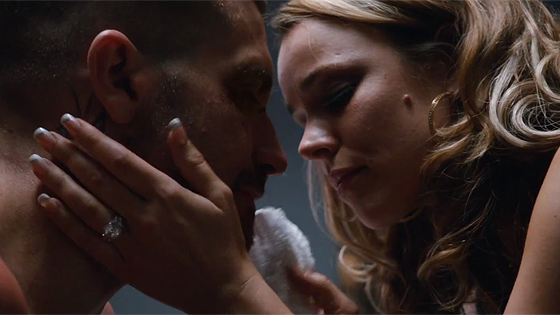Every couple of years we get a new boxing movie, usually a tale of a book-dumb but street-wise hustler who is either trying to claw his (or her) way out of poverty or already got out of poverty and claimed fortune and fame only to lose it all and have to work back up from the bottom again. Either it’s achieving the American Dream or seeking redemption for losing that Dream. Usually our lead pugilist has a family to provide for or a life partner to lean on, and usually these things are taken away in some capacity so our hero can, ahem, fight for them. Throw in a training montage or two, some punch-drunk pseudo philosophy, and a few gallons of red-dyed corn syrup, and you have yourself an honest-to-god boxing movie. And in 2015, that movie is called “Southpaw.”
Billy Hope (Jake Gyllenhaal) is the kind of boxer who is at that top of his career; undefeated in 43 fights and the defending world champion, Billy has it all – a mansion for a home, a beautiful wife (Rachel McAdams), a sweetheart of a daughter (Oona Laurence), success, fame, it is all his, and we’re told a few times how he had to get all of this while being raised as an orphan by the state. But after taking so many beatings due to his boxing defensive style being “stop every punch thrown at me with my face,” his wife wants him to take a break and consider retiring so he won’t be a brain dead dope by the time he hits forty years old, and while he hadn’t made the decision yet to do so, he was definitely leaning in that direction when tragedy befalls him and his family when his wife is killed by a gun going off at a brawl at a benefit for a boys home (long story). Billy kind of loses his mind a little and instead of stepping up and being the strong father he needs to be for his daughter, he sinks into depression and substance abuse and behaves very erratically, putting himself and his daughter at risk. Through a series of bad decisions, he quickly loses his home, his money, his entourage, and most importantly, his daughter is taken away and placed in the care of child services while he tries to get his shit together. And in order to do that, he goes to the all-black boxing gym in the city meant for at risk youth and he hooks up with the gym’s proprietor, Tick Willis (Forest Whitaker), who essentially teaches him defense and pushes him to be a less-shitty person.
If any of this sounds familiar, it is because this movie smushes together the “boxer who can’t make money for his family any way other than boxing” plot of “Rocky II” with the “former champion boxer needs to get down and dirty at the urban gym to learn how to win again” plot of “Rocky III,” as well as the “boxer is a shitty father despite meaning well” plot of “Rocky V” and the “boxer struggles with life in the wake of his wife’s death” plot of “Rocky Balboa.” There is also a scene in which Billy Hope has an exhibition boxing match inside a church that feels like a direct shout out to the opening scene of the original “Rocky,” and really, when making a boxing movie these days, how do you not invoke anything from that famed series of films? When making a movie centered on this sport, you are demonstrating that you think you have something worth saying that hasn’t been said with the “Rocky” movies or “Raging Bull” or “Ali” or even “The Fighter,” and that is a tall order.
And that feels like a big problem for “Southpaw” because it seems to want to say something but it can’t focus on what it wants to be about. The central hook of this story is definitely Billy Hope’s need to get his house in order so he can be a good father to his little girl, and having to learn how to be a proper parent without his wife, who actually did all the work. This plot thread is where all the real emotion comes from and where we get the film’s drama. But there is other stuff going on in here as well that feels shallow and undeveloped. For example, at Tick’s gym he has a bunch of young kids from the neighborhood training in there, trying to give them a sanctuary from their harsh lives in an attempt to make good, honest, young men out of them. Predictably, Billy hits it off with one such kid named Hoppy, and Hoppy explains some of his problems with his mom back home, but we never see any of this stuff and it only gets mentioned a couple of times and briefly each time. And then three-quarters of the way through the movie, something happens with Hoppy that is supposed to be a big emotional moment but it doesn’t really matter because we barely got to know the kid. We know that Billy and Tick care about the kid, but we never really know “why” outside of “they are good people deep inside” or some baloney like that. This tragedy feels like it happened because the screenplay dictated it needed to happen, as opposed to being an organic extension of the story. And there is also this whole thing with a child services worker named Angela Rivera (Naomie Harris) who takes what seems to be an unusually strong interest in Billy Hope’s recovery, to the point where she accompanies him and his daughter to the big final fight in the movie and it just seems strange, like, does this lady go this far for other people going through the whole child services rigmarole? Why does she feel the need to go the extra distance with this particular family? She’s not a love interest because Billy is grieving the entire movie, and she’s not a surrogate mother figure because she just shows up and does her job.
Equally underdeveloped but much more to the detriment of this movie is the “bad guy” boxer Miguel Escobar (Miguel Gomez), who starts the movie out as a Clubber Lang type of character, taunting Billy in the immediate aftermath of a successful title defense and shit talking the guy to goad him into fighting. But he disappears for much of the film, as Billy goes off to do his “training with Apollo Creed” portion of the story, and even in the beginning when he is being set up as the disrespectful bad guy boxing opponent, he is still weirdly respectful and levelheaded at times, like when his own entourage is being kind of noisy while Billy gives a speech at a fundraiser and tells them to cool it. You would think to build the antagonism even more between these two characters and to make the animosity even more palpable, Miguel would be leading the way in being disrespectful to Billy, maybe by being the loudest one at that table and interrupting the speech and being a dick so we can all hate him. But that’s not Miguel, he’s more nuanced than that, and quite frankly, a nuanced antagonist is not what’s called for in a boxing movie, especially one like this in which so many characters are painted with the broadest strokes ever. Just look at boxing promoter Jordan Mains (Curtis “50 Cent” Jackson, as he’s billed in the credits), who is an obvious take on the Don King archetype, all smiles and promises to Billy until Billy can’t make him money anymore, and then Jordan moves on to the next guy. We’re TOLD that Jordan MAY have paid off some judges in the past, and there is a quick throwaway line later in the movie in which he tells Miguel that fighting Billy shouldn’t be too hard because he only gave him six weeks of preparation time, so APPARENTLY this guy is a businessman dickhead, but that is surprising to NO ONE AT ALL.
It is a shame that this screenplay wasn’t whittled down to something more manageable, focusing on one or two aspects of the plot and dropping the rest, because director Antoine Fuqua has the chops to make a movie like this. The boxing scenes are done well, and he knows how to tell a story visually, which is very important when trying to turn a 12 round boxing match into its own little story with a beginning, middle and end. And the movie is cast pretty well, with Jake Gyllenhaal bringing that now expected level of intensity that brings to much of his work, and with Forest Whitaker doing a great job with the “Morgan Freeman in ‘Million Dollar Baby’” role.
It actually feels like there is a great boxing movie in here somewhere, like a statute inside a piece of marble that needs to be cut out, and “Southpaw” could have used a little more trimming and refining to make it something truly memorable and special. Instead as it is, the movie is merely good, perhaps a little overly dour, but nonetheless entertaining. It’s just not something that I’ll be hungering to revisit any time soon, if ever again.



 Spillover Bonus Episode – Movie News Round Up
Spillover Bonus Episode – Movie News Round Up Review: ‘The Rover’
Review: ‘The Rover’ #541 – Get On Board With the Vibes
#541 – Get On Board With the Vibes #587 – Cross Bosch Reacher
#587 – Cross Bosch Reacher
Leave a Reply
You must be logged in to post a comment.